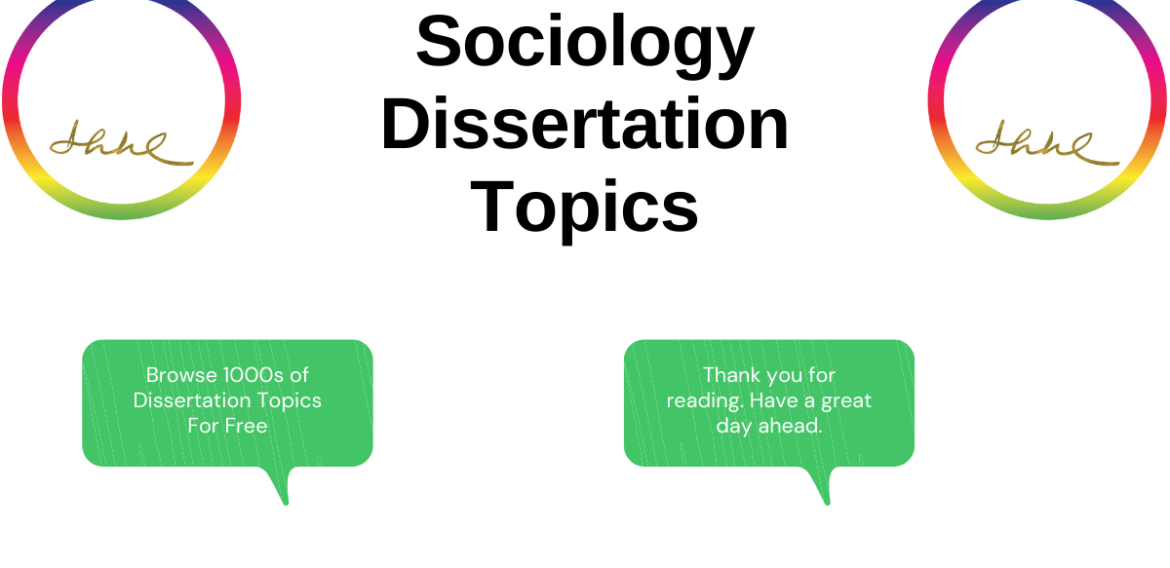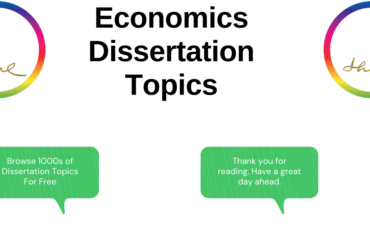Sociology Dissertation Topics
The majority of researchers have the erroneous belief that’research’ can result in a fully new breakthrough in academia. The golden rule for dissertations is that the term’research’ should be a compound of the prefix’re-‘ and the word’search. As a result, the primary purpose of a dissertation should be to’research’ already published content in order to add value to it. The most productive dissertations eliminate buzzwords and broad subject areas in favour of something more focused, targeted, and controllable. When establishing dissertation subjects, research purposes, and objectives, researchers should always follow the guideline to “never choose a topic solely because it is hot in current debate.” It is preferable to select an unusual issue, yet one in which the researcher has an interest and talent. Cultural sociology, educational sociology, religion and belief studies, family studies, sociology of crime, sociology of the penal system, political sociology, industrial sociology, and gender studies are all possible themes for sociology dissertations.
Editingarsenal has compiled a list of some of the most popular and common dissertation topics from a variety of academic disciplines, so you can pick and choose what to write about. If you need dissertation editing assistance , don’t hesitate to contact one of our qualified and experienced editors and proofreaders.
Economics Sociology Topics
- Economic analysis, as a subfield of sociology, views the economy as an institution that organises a society’s production, distribution, and consumption of goods and services. Economic sociology can be studied by examining various economic systems, such as capitalism and capitalism combined with socialism. Economic sociology can also be used to examine corporate corporations, the social organisation of labour markets, job classifications, and worker migration patterns. The following are some possible sociology dissertation topics:
- A comparison of communism and capitalism’s economic systems to determine how each influences social hierarchy.
- In modern Britain, it appears as though there is still a social split between the lowest and higher classes.
- A study of the UK economy through the lens of Marx’s critique of capitalism.
- Do you have any thoughts on the social shifts that occurred as Britain transitioned from capitalism to the information age?
- Is there any downside to the UK’s rising reliance on overseas labour migration?
- In the United Kingdom, how well does the communist model work? An assessment of the situation.
- Is it conceivable for the informal economy to stimulate economic growth on a local level?
- Consumer expenditure in the United Kingdom has a range of societal consequences.
- Are economic downturns having an effect on the social status of secondary market workers?
- Recognize the economic linkages that run through a British family.
- In other words, what are the consequences of the growing “gig economy?”
- Families with one working parent and families with two working parents are contrasted. What are the societal repercussions of multiple employment?
- Are you making future plans? Comparing the spending and saving habits of children and adolescents to those of their parents and grandparents.
Comparative Sociology Topics
- One of sociologists’ primary objectives in this field is comparing various forms of government and their effects on various parts of society, such as the economy or income distribution. Along with evaluating social institutions such as education, the economy, the family, marriage, and the state of health and religion within a single society (or even between societies), sociology can also examine racial/ethnic/gender issues inside and across societies. These sociology dissertation samples might assist you in getting started on your paper:
- A comparison of the effects of capitalism and communism on social inequality.
- Labour markets and labour market movements in the United Kingdom and China are compared.
- Analysis of the well-being of citizens in comparison to other countries The United Kingdom’s welfare state against Japan’s state capitalism?
- Is the UK sticking to a ‘traditional’ way of life? Examining the mechanisms by which diverse cultures are diffused in contemporary British society.
- Gender concerns in contemporary life in the United Kingdom and the Middle East will be compared.
- Marriage as a social institution in the United Kingdom and India is compared.
- Comparing strongly religious countries to those that are not?
- A comparative examination of the family structures in the United Kingdom and Russia.
- To what extent may the United Kingdom’s and North America’s educational systems be utilised to alter social norms?
- Assessing a citizen’s well-being and social development: a comparison between democracy and totalitarianism?
- A research comparing the health and well-being of persons living in nations with predominantly free healthcare to those living in countries with largely private healthcare.
- Taking care of senior family members – Western and Eastern countries’ perspectives and techniques are compared.
- The study contrasts nations that permit joint paternity and maternity leave with those that permit solely maternity leave.
Gender Sociology Topics
- Gender sociology has long been one of sociology’s most prominent subfields. The overwhelming bulk of academic study in this field is conducted in underdeveloped nations, where gender relations are typically complex. This area encompasses gender dynamics inside households and the role of men and women in societal functioning. Additionally, feminists employ gender sociology to examine how men and women are treated differently based on their gender. If you’re interested, you could use this as the basis for a sociology dissertation.
- How much bargaining power do women have in a home in a developing country?
- Discrimination against rural women in developing nations is justified on a number of grounds.
- Who or what are the societal forces that shape gender relations in a society?
- What relationship exists between inherited behavioural patterns and the creation of gender roles?
- What factors contribute to girls’ lack of educational opportunities?
- Discrimination against women in the workplace occurs for a variety of reasons.
- What effect does religion have on gender roles and perceptions of them?
- What role do women play in earning revenue in developing countries?
- What role do women play in a power-political society?
- How does the media influence society gender roles?
- What impact does social media have on gender identification in developed countries?
- What causes have contributed to the rise in workplace sexual harassment, and what are the barriers to reporting such encounters?
- Even if you perform the same job, how come men and women earn such varied salaries?
Political Sociology Topics
- Political sociology investigates the intricate links between power and authority, individual and group interests. Political movements have a historical and contemporary impact on society as a result of power struggles between individuals, groups, political institutions, and economic interests in today’s world. If you’re writing a dissertation in political sociology, the following tips can help you focus your research:
- What role do social forces play in UK power politics?
- Is British politics founded on a social class theory in which the ruling elite competes for power? A critical assessment of UK politics based on Marx’s theories.
- To what extent is democracy suitable to a capitalist society?
- What role does ‘pluralism’ as a political model play in contemporary British society?
- How do women and men vote in the United Kingdom’s political system?
- A critique of the United Kingdom’s welfare state.
- How do religion and politics intersect when it comes to key social institutions?
- Is it preferable to have charismatic leaders or a reasonable legal system in place in the context of contemporary British society?
- What role and significance do ethnic minorities play in British power politics?
- What are the implications of globalisation for the modern nation-state and politics?
- What is culture’s influence on political ideology and values, and how does it work?
- To what extent may individuals influence the social and political functioning of society?
- When and how does the state respond to societal threats to democracy?
Sociology of Crime Topics
- Criminology is a subfield of sociology that examines crime in all of its manifestations, from the individual criminal to gangs and large-scale crime. Additionally, it examines the effectiveness over time of various crime control techniques, including the usage of capital penalty. A criminology dissertation could be beneficial and well-read in today’s culture, when crime is such an important and often talked topic.
- What are the primary societal factors of the growth in knife crime in the United Kingdom?
- Infractions that the police are “aware” of and have noted in their files: The shortcomings of the United Kingdom’s criminal statistics.
- What are the most egregious manifestations of social deviance in the United Kingdom?
- A historical examination of the socioeconomic elements that contribute to gang and street violence in the United Kingdom.
- Is there proof of erroneous crime reporting?
- What are the disparities in criminal behaviour amongst ethnic groups, genders, and religions in the United Kingdom?
- Is the increase in teenage criminality in the United Kingdom mostly a result of Durkhaim’s concept of ‘Anomie’?
- A review of the government’s changes and policies in the area of crime prevention.
- Is punishing offenders the only way to put an end to crime? Investigating alternate methods of crime prevention on a societal level.
- Is excessive alcohol consumption a significant social and behavioural risk factor for criminal behaviour in the United Kingdom?
- Investigations into victimology: Are the perpetrators of crimes the true victims?
- How can positivism account for the criminal’s power over others?
- With the assistance of government action, individual criminal behaviour is socially formed.
Sociology of Education Topics
- Sociology of education is the study of how diverse social forces affect society’s educational system. These aspects include individuals in a society, public education policy, educational frameworks, and public sector institutions. It includes both private and public schools, as well as institutions of college and continuing education. You may choose from any of the following sociology of education themes for your sociology dissertation.
- A sociology of education policy in the United Kingdom since World War II is examined.
- Analyzing the relationship between a teacher’s motivation and student accomplishment in a public school; examining public school structures and their application to socially excluded kids.
- Examining the organisation and outcomes of social advice and counselling in schools.
- Children’s perspectives of society at a macro level are formed by their educational experiences.
- Examining the relationship between higher education fees and scholarship rules and the UK’s social stratification.
- Investigating and determining how a school system may assist vulnerable children by closing the achievement gap, as well as creating systemic reforms.
- Assess whether public schools are prepared to promote interfaith understanding and cooperation among students.
- To determine if the public school system in the United Kingdom is perpetuating social inequality, we must examine Marx’s Conflict Theory in education.
- Is the national curriculum prioritising sociological goals above economic ones?
- Should the UK’s education system be guided by neo-liberal theory?
- Is teacher-student interaction good or detrimental to pupils in basic schools?
- Whether students fail or succeed in school is a function of their “individual problems” or “public problems.”
Sociology of Religion Topics
- Sociology of religion encompasses a broad variety of subjects concerned with the influence of many aspects on religion and the influence of religion on diverse social issues. It explores, among other things, how religion interacts with and is influenced by social variables such as social interaction, the media, and politics. Additionally, sociology as a whole addresses modern topics such as gender, inequality, and stereotypes in society. If you are interested in the sociology of religion and wish to write about it in your sociology dissertation, you may find these sociology dissertation themes beneficial.
- In the United Kingdom, religious views and ideals are compared across the country.
- In the United Kingdom, print and electronic media have affected public opinions of various religions.
- Recognize common religious values that can be leveraged to promote interfaith cooperation in the United Kingdom.
- What role has social interaction had in the spread of religion among people of various faiths?
- Gender and sexuality issues are studied in light of many religious traditions.
- Is there a link between religious beliefs and social change?
- Examines the impact of religious organisations on the United Kingdom’s social structure.
- Establishing a link between religious beliefs and political behaviour in the United Kingdom.
- Investigating the impact of religion on marriage in the United Kingdom.
- Examining the relationship between religion and education as social institutions.
- Is it possible to analyse current religious behaviour using Goffman’s ‘ritualised interactions’ and everyday life interactions?
- How are religious values and religious norms presently binding on UK citizens?
- Is it ethical to maintain a distinction between the public and private realms when some people’s private spheres are religious?
Sociology of Marriage and Family Topics
- Family and marriage studies are related fields in sociology. The topics covered include family structure, child count, parent-child relationships, intra-family gender dynamics, family internal and external social interaction, the impact of social change on the family, marriage systems, the dynamics and types of marriage and rituals, and post-marriage social interaction. All of these subjects are addressed. This section will compare and contrast various civilizations or historical times. The following are some suggestions for sociology dissertation topics:
- A historical assessment of the fundamental structure and size of the British family.
- The impacts of periodic societal change on the family structure in the United Kingdom are being investigated.
- Contrast living in a nuclear family system with that of a blended family system that includes biological and stepfamily members.
- Analyzing child-parent relationships in a typical British household in order to have a better understanding of the dynamics.
- Fertility rates in the United Kingdom and the factors that influence them are being examined to determine if they are changing.
- An in-depth examination of relationships between couples from diverse regions of the United Kingdom.
- A look back at the evolution of the divorce rate and the primary reasons behind it in British society.
- Investigating the causes and implications of the United Kingdom’s various housing patterns.
- Identifying the societal determinants of family violence.
- The impacts of familial violence on children are being investigated.
- The study of family change and continuity, as well as the ability to trace present patterns of family structure back to older ones.
- Inequality in society is related to family composition and social strata differences.
- Which academic institutions, public organisations, and government agencies have responded to family diversity, and how has this response impacted family commitment?
Cultural Sociology Topics
- Cultural sociology is a subfield of sociology that is widely used in academia. This course will cover topics ranging from a society’s values and beliefs to norms and material and non-material culture. Students are typically introduced to cultural sociology through the works of well-known sociologists such as Marx, Weber, and Durkheim, among others. The following are sociology dissertation topics relevant to this discipline:
- Examining the applicability and validity of Marx’s “Conflict Theory” in contemporary British society.
- Do the social structures in the United Kingdom conform to Weber’s rationalism theory?
- Conducting historical research on the ebb and flow of high culture in the United Kingdom.
- It’s been a few decades, but is British pop culture still the same?
- Do the cultural values, norms, and beliefs of immigrants differ from those of the indigenous population in the United Kingdom?
- What can an individual from Asia or the United States anticipate in terms of cultural shock?
- Examining the societal divides created by cultural distinctions.
- Observing changes in the UK’s counterculture.
- Is the United Kingdom divided into distinct subcultures depending on where you live?
- Identifying the positive and negative aspects of intercultural social interaction.
- Is Gramscian hegemony still relevant in today’s debates about British society?
- Analyzing the ways in which Max Weber’s methodological concepts might be used to describe contemporary cultural processes and principles.
- How well-suited is Durkheim’s work, and later that of the Durkheim school, to contemporary culture?
Industrial Sociology Topics
- Industrial sociology, often known as work sociology, is a subfield of sociology. This subfield of sociology is concerned with the social and human interactions that occur at work. Diversity in the workplace involves a broad range of topics, including employee morale and workplace morale, as well as productivity, unionisation, and corporate citizenship. Additionally, it addresses themes such as organisational social structures, social groupings inside organisations, and workplace cultural diversity. The following are some possible sociology dissertation topics:
- What social structure should a large organisation in the United Kingdom have?
- Is the role of trade unions to the social welfare of British workers changing over time?
- Is there a relationship between culturally responsive organisational policy and employee happiness and performance?
- How can firms encourage cultural harmony while also managing intra-organizational diversity?
- What are the social consequences of workplace automation for employees?
- How has the social organisation of a British firm influenced societal conventions, values, and social status?
- What distinguishes modern industrial nations such as the United Kingdom?
- What relationship exists between a worker’s motivation and output?
- What are the social dimensions of communication inside an organisation?
- Is it more accurate to define the relationship between a line manager and his or her employees in terms of social or organisational criteria? What tools are available to managers in order to establish a healthy balance?
- What role do postmodern identity, control, and occupational orientation play in individual sociology?
- Workplace social organisation and Asian-owned businesses.
- Workplace motivation and the advantages of employee-chosen reward programmes.







